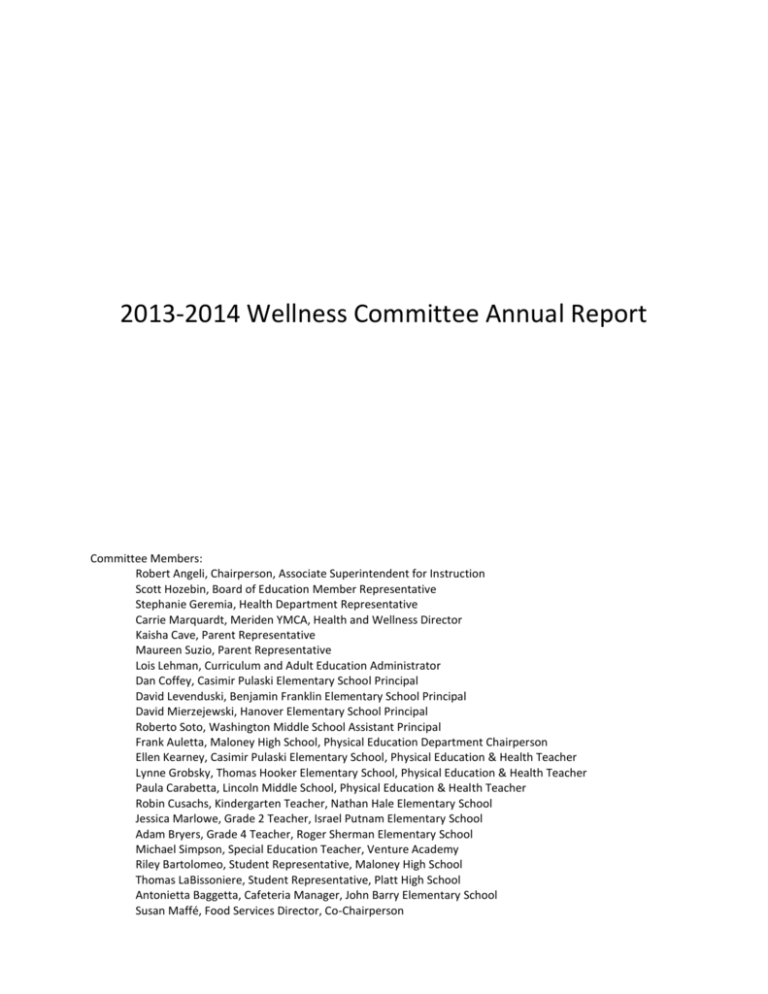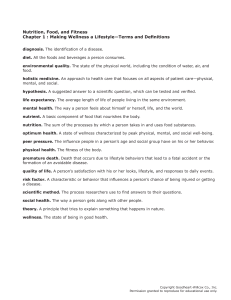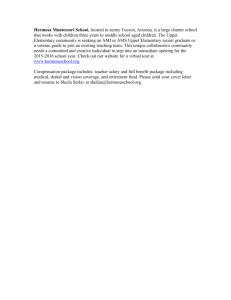2013-2014 Wellness Committee Annual Report
advertisement

2013-2014 Wellness Committee Annual Report Committee Members: Robert Angeli, Chairperson, Associate Superintendent for Instruction Scott Hozebin, Board of Education Member Representative Stephanie Geremia, Health Department Representative Carrie Marquardt, Meriden YMCA, Health and Wellness Director Kaisha Cave, Parent Representative Maureen Suzio, Parent Representative Lois Lehman, Curriculum and Adult Education Administrator Dan Coffey, Casimir Pulaski Elementary School Principal David Levenduski, Benjamin Franklin Elementary School Principal David Mierzejewski, Hanover Elementary School Principal Roberto Soto, Washington Middle School Assistant Principal Frank Auletta, Maloney High School, Physical Education Department Chairperson Ellen Kearney, Casimir Pulaski Elementary School, Physical Education & Health Teacher Lynne Grobsky, Thomas Hooker Elementary School, Physical Education & Health Teacher Paula Carabetta, Lincoln Middle School, Physical Education & Health Teacher Robin Cusachs, Kindergarten Teacher, Nathan Hale Elementary School Jessica Marlowe, Grade 2 Teacher, Israel Putnam Elementary School Adam Bryers, Grade 4 Teacher, Roger Sherman Elementary School Michael Simpson, Special Education Teacher, Venture Academy Riley Bartolomeo, Student Representative, Maloney High School Thomas LaBissoniere, Student Representative, Platt High School Antonietta Baggetta, Cafeteria Manager, John Barry Elementary School Susan Maffé, Food Services Director, Co-Chairperson The Child Nutrition and WIC Reauthorization Act of 2004 required that each local education agency (LEA) or school district participating in the National School Lunch Program and/or School Breakfast Program develop a local wellness policy that promotes the health of students and addresses the growing problem of childhood obesity. As per the legislation, each school district's local wellness policy, at a minimum, must address/establish: Goals for nutrition education, physical activity and other school-based activities that are designed to promote student wellness Nutrition guidelines for all foods available on each school campus during the school day with the objectives of promoting student health and reducing childhood obesity Implementation measurement, including designation of one or more persons within the local education agency or school, charged with the operational responsibility for ensuring that the school meets the local wellness policy Involvement of parents, students and representatives of the school food authority, the school board, school administrators, and the public in the development of the school wellness policy The Student Nutrition and Physical Activity Policy requires an annual report to the Superintendent and the Board, evaluating the implementation of the policy and the regulations, as well as recommendations for changes or revisions. The Wellness Committee is proud of its accomplishments in the 2013-2014 school year. A brief summary of these accomplishments is below. Fresh Fruit and Vegetable Program Grant Award Four Meriden elementary schools were awarded a total of approximately $130,000 in 2013-2014 to participate in USDA's Fresh Fruit and Vegetable Program. The goals of the grant are to: create a healthier school environment, increase the variety of fresh fruits and vegetables that children experience, make an impact in children's diets by increasing the consumption of fresh fruits and vegetables, and to serve fresh fruits and vegetables to all students for free throughout the school day. With the continued success of the program, all eligible elementary schools were excited to take advantage of the opportunity to apply for the 2014-2015 grants. We are currently awaiting grant awards and anticipate receipt of approximately $130,000 for the upcoming year. Fuel Up To Play 60 Grant Award The Wellness Committee continues to encourage participation in Fuel Up To Play 60, a partnership by the National Dairy Council and the National Football League, further empowering students to take action to improve nutrition and physical activity at their school and for their own health. Each school is eligible for up to $4,000.00 of funding each school year. Benjamin Franklin Elementary School was awarded $1,750.00 for the 2013-2014 school year. Casimir Pulaski Elementary School, previously awarded $7,500.00 in a two year period, is currently in the process of applying for a Fuel Up To Play 60 grant for the 2014-2015 school year. Action for Healthy Kids Grant Awards The Meriden Public Schools was awarded $15,000 to promote school breakfast programs and increase participation in school breakfast through the provision of Universal Free Breakfast. John Barry, Israel Putnam and Roger Sherman each received $5,000 in grant funds to implement Universal Free Breakfast. Breakfast participation has increased by 148% at John Barry, 127% at Israel Putnam, and 155% at Roger Sherman. Meriden's Health Heroes Initiative Under the continued leadership of Maloney High School Student Representative Riley Bartolomeo and Physical Education Teacher Keith Moyer, Nathan Hale Elementary School has worked to assist students in: increasing the consumption of fruits and vegetables, getting one hour of physical activity daily, limiting television to two hours per day, and getting eight to ten hours of sleep each night. Students who demonstrate the qualities of a "health hero" have their picture posted in the cafeteria, giving others students encouragement to model similar behaviors. Benjamin Franklin Elementary School Wellness Committee With funding received from both Action for Healthy Kids and Fuel Up to Play 60, the Benjamin Franklin Elementary School Wellness Committee purchased "Fit Decks" for each classroom. The "Fit Deck" physical activity cards are intended to provide options for teachers to promote movement during indoor recess and as classrooms transition from one activity to the next. The Wellness Committee also purchased Fit Deck Activity Signs for outdoors. All teachers have been provided with a laminated 'cheat sheet' for a variety of quick and fun activities that they can initiate with their students, whether in the classroom, hallway or outdoors. -1- Other planned activities for the remainder of the year include a "Juice Jam" (nutritious smoothies) or "Milk Mustache" activity to be conducted during lunch waves, with the goal of encouraging students to try different fruits, vegetables and dairy products, understand their nutritional importance, and encourage their consumption. Additionally, the committee will be holding a fitness competition, planting a pizza garden and sponsoring in a wellness walk scheduled jointly with St. Joseph's School and health and wellness exhibitors. Wellness Committee Webpage The Food Services Program maintains the Wellness Committee webpage at: http://www.meridenk12.org/Departments/Food_Services/Wellness_Policy/ Resources for Parents and Teachers Additional parent and teacher resources were added to the Food Services website and will continue to be enhanced. The link to the website is: http://www.meridenk12.org/Departments/Food_Services/Parents_and_Teachers/ Continued Healthy Food Certification Participation Meriden proudly continues to voluntarily certify with the State of Connecticut Department of Child Nutrition to sell only snack items that meet the Connecticut Nutrition Standards, which focus on limiting calories, fat, saturated fat, trans fat, sodium and sugars, moderating portion size and promoting increased intake of nutrient-dense foods, such as whole grains. School Gardens Under the leadership of Marcia Johnson, John Barry Elementary School's garden doubled in size last year and shared its bounty with the local soup kitchen and homeless shelter. During the summer of 2013, John Barry's grade 2 -5 garden club students came to school at least three days per week. They participated in both Meriden Public Schools' and New Opportunities' breakfast and lunch summer feeding programs. They weeded and watered the garden and learned about gardening as integrated into the curriculum areas of science, math, social studies, reading, writing and art into our garden-themed activities. Students also helped to prepare recipes with the vegetables they harvested. High school volunteers help in the garden to earn community service hours to meet a graduation requirement Ms. Johnson applied for and received the 2013 Connecticut AgriScience Award Grant. With those funds, Ms. Johnson received a $500.00 grant to support her work at John Barry and an all-expense paid trip for her students to attend the Big E. In addition, Ms. Johnson is going to be recognized as "Connecticut's Agriculture in the Classroom Teacher of the Year" at the National Agriculture in the Classroom Conference, for which she applied, as well as received funding for her registration. Ms. Johnson is now working at Nathan Hale Elementary School and is implementing a school garden program as well as her annual "Summer in the Garden" program for students. Ms. Johnson has obtained 10 raised beds to use for the garden at Nathan Hale and has purchased fruits and flowers for companion planting with grant funds totaling $2,750.00 from Lowes and the Connecticut Farm Bureau. Ms. Johnson also submitted a project to "Donors Choose" called "Yes, In My Backyard!" to include becoming familiar with, taking care of, and respecting the environment right outside of our schools and homes, as well as gardening and bird watching. Healthier US Schools Challenge (HUSSC) Awards and Applications Washington and Lincoln Middle Schools have been awarded Healthier US Schools Challenge Silver Awards/Certification from USDA. Currently, less than 7% of the schools in the nation have this five-year certification, which recognizes excellence in nutrition services provided and opportunities for physical education and activity that result in a healthier school environment. Meriden Public Schools also applied for and received the HUSSC Silver Award for Thomas Edison Middle School. With the extended day program activities at Casimir Pulaski Elementary School being offered, Pulaski has become eligible for the Healthier US Schools Challenge Award and has applied for a Gold Award of Distinction – the highest award offered by USDA. Currently, no school in Connecticut has received an award level higher than a silver award. In addition, USDA strengthened the criteria for awards effective July 1, 2012. Casimir Pulaski, whose application was submitted in June 2013, hopes to be the first school in the nation to receive the Gold Award of Distinction under the revised criteria. Currently, the Food Services Program is working on three additional Healthier US School Challenge Applications: a Gold Award of Distinction for John Barry Elementary School, a Silver Award for Benjamin Franklin Elementary School, and a Bronze Award for Thomas Hooker Elementary School. A webpage on the district's progress on Healthier US Schools Challenge Awards and Applications can be found at: http://www.meridenk12.org/Departments/Food_Services/Meriden-Food-Service-Awards/ -2- Summer School - Meriden Public Schools' Summer Food Services Program In July 2013, John Barry Elementary School provided a free breakfast program and a free working snack program through the seamless summer food service program for our elementary students entering grades 1, 2 and 3 enrolled in summer school. Summer is a time of food insecurity for many families. Breakfast was offered in the classroom to each student enrolled at the beginning of the school day and was also offered to all children 18 and under from the community for a 45 minute period on the patio outside of the cafeteria. A healthy working snack was provided prior to dismissal to students, as well as all children 18 and under after dismissal for a 45 minute period. Due to differing regulations for the seamless summer food service program, these meals and snacks were able to be provided at no cost to families or the Food Services Program. In fifteen days, over 4,800 students and children from the community were served a free breakfast and over 6,600 students and children from the community were served a free nutritious snack. The summer school breakfast and snack program at John Barry Elementary School will be offered again in July 2014. In August 2013, Hanover Elementary School, which houses the kindergarten summer school program, also provided free breakfast to students and children 18 and under in the community. In the ten days of summer school, over 1,800 students benefited from this program. The summer school breakfast program at Hanover will be offered again in August 2014. Promotion of New Opportunities' Summer Breakfast and Lunch Program The Meriden Public Schools' Food Services Program has worked closely with New Opportunities to promote their Summer Food Services Program in its many locations throughout Meriden. The promotion has included information on student menus, Meriden Public Schools' community access television station, and a webpage with information on the Food Services' website. Healthy Hunger Free Kids Act of 2010 The Healthy Hunger Free Kids Act of 2010 required the USDA to develop new nutrition standards for school breakfasts and lunches, based upon the current Dietary Guidelines for Americans and current science, as reviewed and recommended by the Institute of Medicine. Based upon proactive menu changes over several years, minimal changes were required by the Meriden Public Schools' Food Services Program to be in compliance. Meal pattern changes required by regulation and scheduled to be implemented for school year 2014-2015 include: the requirement of one cup of fruit being offered and half a cup of fruit being selected by students at breakfast and all grains served at both breakfast and lunch containing at least 51% whole grain. USDA "Smart Snack" regulations also are scheduled to take effect in 2014-2015. These changes require that any item sold outside of a reimbursable breakfast or lunch (snack, school store, fundraiser) during the school day meet one of three general criteria: 1) be whole grain or 2) contain a "food group" as the first ingredient or 3) be a combination food that contains at least ¼ cup fruit or vegetable. Nutrition Rating Systems Grant In 2013, the Meriden Public Schools was awarded a $50,000 grant from the Connecticut State Department of Education (CSDE) to develop and implement a new school nutrition rating system pilot program. Meriden was one of only three districts in the state to receive this award. A goal of the pilot was to create a model for schools across the state to use to encourage a healthier eating lifestyle for students. With the award, Meriden created the stoplight program, a nutritional rating system that allows students to easily identify healthy foods and make better nutritional choices. Foods are labeled green, yellow, or red and each color has a different meaning. Green foods are a "go", meaning you can eat more, yellow signifies "slow", meaning eat only occasionally, and red is for "whoa", meaning these foods should be eaten rarely. The color-coded system simplifies awareness of healthier meal options, especially for elementary and middle school students. The Food Service Department assigns each food a color based on ten nutritional characteristics, such as, percent of calories from fat and percent of sugars by weight. Parents are able to view color-coded menus online and help guide their children to make better choices. Color breakfast and lunch menus are created and distributed to all elementary students. The grant also funded web-based tools for input of nutritional information of single food items from home and a recipe analysis tool to find out its stoplight rating. These tools can be found at: http://www.meridenk12.org/Departments/Food_Services/Nutrition-Calculator-/ -3- The Food Service Department is tracking purchases made over a two-year period after the program starts to determine if the rating system works to change students food choices from "slow" and "whoa" foods to more "go" foods. This sustainable initiative has been expanded to all schools in the district. School Climate Survey Data Although there are no specific questions regarding food services on the school climate survey, based upon the number of comments received regarding the program, data was compiled by school and grade and reviewed to guide future actions and improvements. Although many comments were too vague to act upon, this review will be instituted annually in an attempt to continue to improve services and evaluate student suggestions. Expanded Services to Extended Day Program Based upon the number of hours in the school day, extended day schools are also eligible to receive a free "after school snack" during the school day under USDA's After School Snack Program. The working snack will consist of a whole grain-based snack and six ounces of 100% juice provided at no charge to the student, the Food Services Program or the Board of Education. This program was implemented at both extended day schools and will be able to be implemented at Roger Sherman Elementary School in 20142015. st 21 Century Grant/REACH Pilot Dinner Program Under criteria established by USDA, the REACH Program offered at Washington and Lincoln Middle Schools meets the criteria of an "at-risk after school care center" by providing: organized, regularly scheduled activities in a structured and supervised environment, which include education or enrichment activities. As a result of having 50% or more of its students eligible for free or reduced priced meals, these participating students are able to be provided with a free afterschool dinner meal, meeting USDA meal pattern and nutrition standards. The pilot in 2013-2014 has proven to be successful, as evidenced by student participation. The program will again be offered in 2014-2015 at no cost to students, families, the Food Service Program or the Board of Education. Connecticut Food Bank Back Pack Program Thanks to the Connecticut Food Bank, sixty students from John Barry, Casimir Pulaski and Roger Sherman Elementary Schools are sent home on Friday afternoons with a backpack filled with two days' worth of food for the weekend that is shelf-stable and can be opened and prepared by the students themselves. These families were chosen by the guidance directors and administrators of each school. The Washington Middle School cafeteria staff members pursued this opportunity for Meriden Public Schools, at no cost to the students, schools or Board of Education. Connecticut Fitness and Nutrition Clubs in Motion at Roger Sherman Elementary School Roger Sherman Elementary School, in collaboration with the University of Connecticut and 4H, is in its second year of the Connecticut Fitness and Nutrition Clubs In Motion (CT FANs IM) project. This after school and summer program is aimed to lower obesity risk in children ages 9-14. Children are taught healthy living strategies, such as fun and effective daily physical activities and healthy food choices. Over the past two years, students have learned an immense amount about nutrition and fitness. They have learned about the five food groups and how to create healthy meals based on My Plate guidelines and how to substitute unhealthy foods with more nutritious ones. They have also had the opportunity to learn new recipes and to try a variety of healthy snacks prepared by professional chefs. In addition to learning about muscle groups and how the body works, students learned that being active is not only fun, but promotes excellent health. CT FANs IM provides students with fun and healthy extracurricular activities and prepares them to lead healthy lifestyles today, tomorrow, and in the future. Fitness Center Grant The Meriden Public Schools is currently in the process of applying for a $100,000 grant from the National Foundation for Governors' Fitness Council. With the goal of improving youth fitness, this grant will provide the awarded school strength training equipment, cardio fitness equipment, and interactive exercise games. The grant also funds the design, delivery and installation of the equipment within the school's existing structure. -4- Staff Wellness Initiatives A voluntary wellness program was offered by the City of Meriden to all Board of Education employees who purchase health insurance. CIGNA, our health insurance provider, has also provided opportunities for free or at a reduced cost, such as, wellness, obesity prevention, and exercise classes. Local businesses and organizations within Meriden have also offered wellness opportunities, such as reduced price gym memberships. District Participation on Childhood Obesity State Task Force Food Service Director Susan Maffé has been appointed by State Senator Danté Bartolomeo to the State of Connecticut's Childhood Obesity Task Force formed to study the effects of obesity on children's health. Ms. Maffé represents school food service personnel across the state on the committee as a licensed dietitian-nutritionist with a background in food service. The five goals of the committee are to: 1) gather and maintain current information regarding childhood obesity that can be used to better understand the impact of obesity on children's health; 2) examine the nutrition standards for all food procured by the state; 3) explore ways to increase physical activity in children; 4) recommend the implementation of a pilot program through one local or regional board of education to schedule recess before lunch in elementary school; and 5) advise the General Assembly and the Governor concerning the coordination and administration of state programs that may reduce the incidence of childhood obesity. Partnerships with University of Connecticut and St. Joseph's College Dietetic Programs The Food Services Program has developed partnerships with The University of Connecticut and St. Joseph's College Dietetics Programs and hosted students for School Food Service Rotations, further encouraging dietitians to choose School Nutrition as a career. This year, the Food Services Program was fortunate to have hosted two dietetic interns from the University of Connecticut this year for a month each. Susan Maffé, Food Service Director, has been asked to represent school food service programs in Connecticut by participating in The University of Connecticut's Dietetics Program Advisory Council. Goal of Representation of all Schools on Wellness Committee Based upon the continued accomplishments of the Wellness Committee and the resultant multiple benefits to the students and families of Meriden Public Schools, the Wellness Committee has solicited a minimum of one representative from each building to serve on the committee. This achieves the committee's goal of expanding the network of wellness ambassadors within the district and expanding programs, opportunities, and initiatives within the district with minimal resources. Recommended Policy Changes and Revisions The Wellness Committee currently has no recommendations for policy changes or revisions. Under the Healthy Hunger Free Kids Act of 2010, additional guidance and requirements for strengthening wellness policies for schools was required of USDA. A proposed rule and comment period closed on April 28, 2014. Upon a final rule being published, the Wellness Committee will begin to assess what, if any, revisions are necessary to the current Wellness Policy. The committee looks forward to another productive year and assisting our students, families and staff in meeting the health and wellness challenges they encounter. -5-








